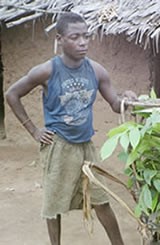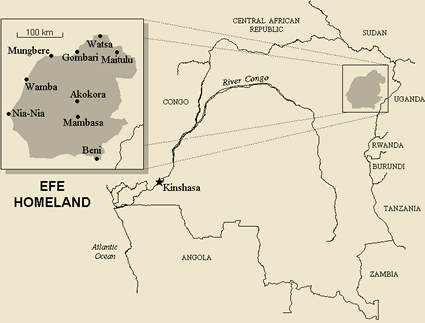A large number of unreached Pygmies live in the tropical rain forests of Central Africa. They inhabit the region that stretches from Cameroon, across the Congo, into Democratic Republic of Congo. At least one of the groups, the Akebou, also occupies parts of Togo, West Africa.
Pygmies are best known for their small size. Adults usually grow to be only three or four feet tall. In fact, their name, "Pygmy," is derived from the Greek word, pyme, which means "a cubit in height."
Pygmies are the earliest known inhabitants of the Congo Basin, which is located in Democratic Republic of Congo. It is also reported that the Ituri Forest has been occupied by Pygmies for over four thousand years. The Pygmies who live there today call themselves Mbuti. The Mbuti includes such groups as the Efe, the Aka, and the Bayaka Pygmies.
Pygmies are lighter skinned than their neighbors. They are a gentle, peaceful people who have the ability to be camouflaged so well in the forest that they can be passed without ever being noticed.
Pygmies are forest dwellers, with most relying on hunting and gathering for survival. Some may also farm in the middle of the forest. However, they will abandon them while the crops are growing to hunt and gather, since that is what they know best.
Today, Pygmies no longer inhabit the forest areas alone. Many groups of farmers have infiltrated the region and built villages there. The two peoples have developed an economic, mutual dependence, and live together peacefully. Because of this, the Pygmies usually speak a dialect of the tribe with which they are associated, whether Bantu, Nigristic, or Sudanic.
Pygmy men hunt deer, pigs, hippos, and elephants. Some Pygmy groups use nets to hunt, while others use spears or bows and arrows. Usually, the only domestic animals that are kept are hunting dogs. Forest resources, such as meat and honey, are traded to farmers for corn, salt, clothes, and iron tools. While the men are hunting, the women are busy collecting wild fruits, roots, insects, lizards, and shellfish. They also do most of the fishing.
Pygmies live in nomadic bands that range in size from 20 to no more than 100 people. These bands wander across the hunting territories that are collectively owned by the whole group.
Pygmy villages are permanent, but campsites are used while the men are hunting. The villages consist of houses and cooking areas. They are usually free of weeds and trees, except for banana or coffee plants. Campsites, on the other hand, are located in the forest, so the sun does not always find them. Perhaps this accounts for their lighter skin color. A typical campsite is small and contains only about 20 to 35 people. Round huts are built and arranged in a circle. They are usually constructed with flexible poles set in the ground in a circular pattern. The poles are bent to where they come together at the top, then tied and covered with leaves. Leaves and bark are used to cover the poles.
A Pygmy generally has only one wife, but polygyny does exist, especially among the Baka. A Pygmy man obtains a wife by giving a gift, or "bride price," to the girl's family. The Mbuti, as well as other Pygmy groups, also practice "sister exchanging" as a means of obtaining wives.
Pygmies typically dress in simple loincloths that are made from the beaten bark of trees. In some tribes, the back strip on the loincloth extends nearly to the ground, giving a "tail-like" appearance. They like these long strips because they look good while they are dancing.
The music of these forest-dwellers differs considerably from the music of their neighbors. Although Pygmies do not have many instruments, they do have drums, whistles, and two-stringed bow-guitars. Their "singing" consists of yodeling, and most songs have only sounds rather than words. They do not often sing in unison, but rather one person sings or yodels at a time.
Pygmies believe that a god named Tore created the world and is the supreme being. He is identified with the forest, since everything is dependent on it. They only call upon Tore during times of crisis. He is usually summoned by a trumpet blast, which is supposed to imitate his voice. Some groups believe that after creating the first humans, Tore was no longer interested in the affairs of the world, and so he withdrew to the sky.
Pygmies also believe that "forest spirits" influence the souls of the dead. The Efe, in particular, believe that after Pygmies die, their borupi, which means "rhythm" or "life," is carried away from the body by a fly. They believe the fly takes them to Tore.
While the national government provides health and educational services for some Africans, Pygmies are not included. Medical supplies as well as trained doctors and nurses are needed to work among them. Educational facilities and teachers are also needed.
Spiritually, the Pygmies are in need of a Savior! They must be told that there is a loving God who cares for them and longs to make them a part of His family. Who will tell them that the Creator is a Father who will never abandon them?
Ask the Lord to call missionaries who are willing to live among the Pygmies and share Christ with them.
Pray that African Christians will begin to reach the Pygmy tribes with the Gospel.
Ask God to raise up Christian teachers and medical teams to work among them.
Ask the Holy Spirit to soften the hearts of Pygmies towards Christians so that they will be receptive to the Gospel.
Pray that God will open the hearts of African leaders to the Gospel.
Ask the Lord to raise up strong local churches among the Pygmies of Central Africa.
Scripture Prayers for the Efe in Congo, Democratic Republic of.
| Profile Source: Bethany World Prayer Center |











